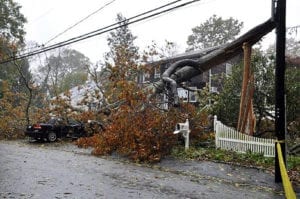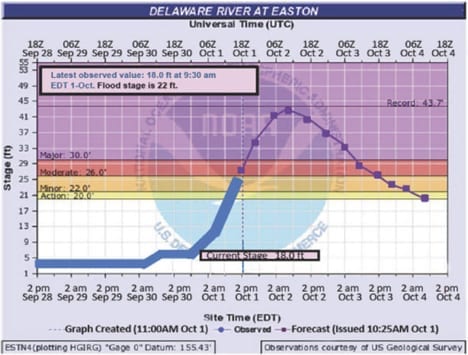When you think of hurricanes, you might think of impacts in Florida, Louisiana, or the Carribean, but hurricanes affect our area as well, as storms like Hurricane Sandy make clear. Since this is National Hurricane Preparedness Week, we want to focus on these extreme storms in our continuing efforts to increase hazard knowledge and community resilience (read more about the CREATE Resilience project here).

Damage similar to what was seen in the Lehigh Valley as a result of Hurricane Sandy in 2012 (Photo from NWS)
Hurricanes can bring major river flooding, flash flooding along streams and creeks, dangerous winds and wind damage, coastal storm surge, tornadoes and other major impacts (Be SMART When It Storms).
Having the right knowledge, resources, and plans before a hurricane hits will help ensure that your family, belongings, and community stay safe. For more information see NNC resources about preparedness and safety during extreme weather events.
– Know More Than the Hurricane Path
– Get Prepared and Help Your Community
– Know the Impacts
– Have a Plan
Information is one of your best defenses in the event of a hurricane. Subscribe to wireless emergency alerts on your cellphone and any other notification services offered in your area. The category of a hurricane only tells you the wind speeds, so listen to local weather forecasts for the impacts you should expect. Use the hydrograph to monitor river levels and learn when the river is expected to crest and how high it is predicted to be (find your nearest river gauge at www.water.weather.gov).
Based on forecasts and forecaster recommendations, you may have to evacuate or shelter-in-place. You should also have a go-bag and family emergency plan ready. It is important to know where local emergency shelters are located and have a planned evacuation route that avoids roads that flood easily – a flood inundation map can help you identify the best route and alternates (available at water.weather.gov). Never drive on flooded roads – Turn Around, Don’t Drown®. Over half of water-related fatalities during the 2016-18 hurricane seasons were vehicle-related (From National Weather Service).
Once you are prepared, you will be able to help your friends and neighbors as well. Check in on those around you, particularly elderly neighbors, and be sure they know where to get updates and have any necessary supplies. When members of a community can look out for each other the community is more resilient! To learn more about hurricanes and other natural hazards and help build your community’s resilience to their effects, sign up for our email list to be informed about the CREATE Resilience project and relevant programs.

